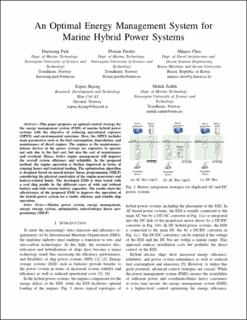| dc.contributor.author | Park, Daeseong | |
| dc.contributor.author | Perabo, Florian | |
| dc.contributor.author | Choi, Minjoo | |
| dc.contributor.author | Skjong, Espen | |
| dc.contributor.author | Zadeh, Mehdi | |
| dc.date.accessioned | 2022-04-06T08:59:41Z | |
| dc.date.available | 2022-04-06T08:59:41Z | |
| dc.date.created | 2022-01-17T10:56:35Z | |
| dc.date.issued | 2021 | |
| dc.identifier.isbn | 978-1-6654-3635-9 | |
| dc.identifier.uri | https://hdl.handle.net/11250/2990118 | |
| dc.description.abstract | This paper proposes an optimal control strategy for the energy management system (EMS) of marine hybrid power systems with the objective of reducing operational expenses (OPEX) and environmental emissions. Here, the OPEX includes main parameters such as the fuel consumption, degradation, and maintenance of diesel engines. The engines as the maintenance- intense devices in the power systems are expensive to operate not only due to the fuel cost, but also the cost of maintenance and overhaul. Hence, better engine management will improve the overall system efficiency and reliability. In the proposed method, the engine operation is further improved in terms of running hours and transient loading. The optimization algorithm is designed based on mixed-integer linear programming (MILP) considering the physical constraints of the engine-generators and battery-related limits. The developed EMS is then tested with a real ship profile by the different cases of with and without battery and with various battery capacities. The results show the effectiveness of the proposed EMS to improve the operation of the hybrid power system for a stable, efficient, and reliable ship operation. | en_US |
| dc.language.iso | eng | en_US |
| dc.publisher | Institute of Electrical and Electronics Engineers (IEEE) | en_US |
| dc.relation.ispartof | 2021 IEEE 22nd Workshop on Control and Modelling of Power Electronics (COMPEL) | |
| dc.title | An Optimal Energy Management System for Marine Hybrid Power Systems | en_US |
| dc.type | Chapter | en_US |
| dc.description.version | acceptedVersion | en_US |
| dc.rights.holder | © IEEE. Personal use of this material is permitted. Permission from IEEE must be obtained for all other uses, in any current or future media, including reprinting/republishing this material for advertising or promotional purposes, creating new collective works, for resale or redistribution to servers or lists, or reuse of any copyrighted component of this work in other works. | en_US |
| dc.identifier.doi | 10.1109/COMPEL52922.2021.9645951 | |
| dc.identifier.cristin | 1982343 | |
| cristin.ispublished | true | |
| cristin.fulltext | postprint | |
| cristin.qualitycode | 1 | |
